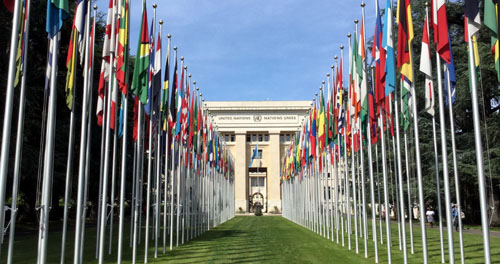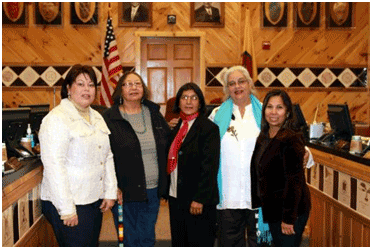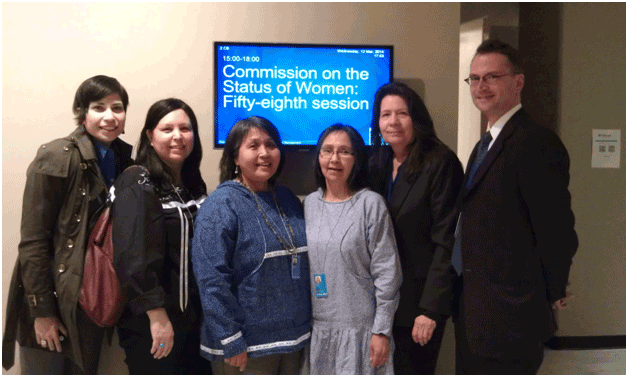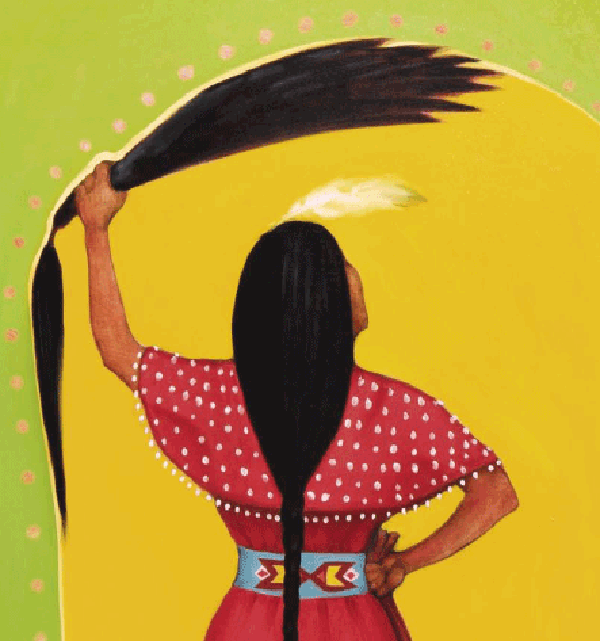 The epidemic of violence against American Indian and Alaska Native women highlights the United States’ failure not only under its own law, including the trust responsibility to Indian nations “to assist tribal governments in safeguarding the lives of Indian women,” but also under international human rights law. Perhaps the most basic human right recognized under international law is the right to be free of violence.
The epidemic of violence against American Indian and Alaska Native women highlights the United States’ failure not only under its own law, including the trust responsibility to Indian nations “to assist tribal governments in safeguarding the lives of Indian women,” but also under international human rights law. Perhaps the most basic human right recognized under international law is the right to be free of violence.
Since 2007, the Center has been collaborating with Native women's organizations and tribes on a national strategy−a strategy that reframes the issue of violence against Native women as a human rights issue, not just a domestic or law enforcement issue. This strategy combines domestic and international advocacy and uses various types of media to raise awareness, generate support, and urge action to restore safety to Native women.
 Through international advocacy, the Center and its partners not only educate, but also add world pressure on the United States to meet its obligations to end all forms of violence and discrimination against Native women. The Center and its partners have raised awareness about violence against Native women in the United States within the United Nations through its Committee on the Elimination of Racial Discrimination, Special Rapporteur on Contemporary Forms of Racism, Special Rapporteur on Violence Against Women, Special Rapporteur on the Rights of Indigenous Peoples, Permanent Forum on Indigenous Issues, Commission on the Status of Women, and Human Rights Council.
Through international advocacy, the Center and its partners not only educate, but also add world pressure on the United States to meet its obligations to end all forms of violence and discrimination against Native women. The Center and its partners have raised awareness about violence against Native women in the United States within the United Nations through its Committee on the Elimination of Racial Discrimination, Special Rapporteur on Contemporary Forms of Racism, Special Rapporteur on Violence Against Women, Special Rapporteur on the Rights of Indigenous Peoples, Permanent Forum on Indigenous Issues, Commission on the Status of Women, and Human Rights Council.
 On September 22-23, 2014, the United Nations held its first ever World Conference on Indigenous Peoples at its headquarters in New York City. Some 38 indigenous peoples from the United States attended, including 15 Native women. Remarkably, five American Indian and Alaska Native women were selected to speak on behalf of various tribes and organizations to the Conference.
On September 22-23, 2014, the United Nations held its first ever World Conference on Indigenous Peoples at its headquarters in New York City. Some 38 indigenous peoples from the United States attended, including 15 Native women. Remarkably, five American Indian and Alaska Native women were selected to speak on behalf of various tribes and organizations to the Conference.
Over 1,000 indigenous peoples attended from all over the world to witness the United Nations General Assembly adopt an outcome document dedicated to implementation of the UN Declaration on the Rights of Indigenous Peoples. The outcome document, among other things, calls on the UN to advance the rights of indigenous peoples by addressing violence against indigenous women.
The Center and its partners also have brought international attention to violence against Native women within the Organization of American States. In 2008, on behalf of numerous nonprofit organizations and tribal governments, the Center and Sacred Circle National Resource Center to End Violence Against Native Women submitted an amicus brief in support of Jessica Gonzales Lenahan, who filed the first human rights case involving domestic violence in any international body against the United States. The case, which involved the deliberate failure of local police to enforce a domestic violence protection order, did not arise in Indian country. However, it has major implications for Native women who rarely see their abusers brought to justice.
 In 2011, the Center and its partners, the NCAI Task Force on Violence Against Native Women and the National Indigenous Women’s Resource Center, participated in the first ever thematic hearing on violence against Native women in the United States before the Inter-American Commission on Human Rights. The Commission has since expressed concern about violence against indigenous women in the United States, noting that such situations tend to be accompanied by impunity and urging the United States to address this violence through laws, policies, and programs. The Center also has worked to press for provisions in the draft American Declaration on the Rights of Indigenous Peoples that would offer protections for indigenous women stronger than those in the UN Declaration on the Rights of Indigenous Peoples.
In 2011, the Center and its partners, the NCAI Task Force on Violence Against Native Women and the National Indigenous Women’s Resource Center, participated in the first ever thematic hearing on violence against Native women in the United States before the Inter-American Commission on Human Rights. The Commission has since expressed concern about violence against indigenous women in the United States, noting that such situations tend to be accompanied by impunity and urging the United States to address this violence through laws, policies, and programs. The Center also has worked to press for provisions in the draft American Declaration on the Rights of Indigenous Peoples that would offer protections for indigenous women stronger than those in the UN Declaration on the Rights of Indigenous Peoples.
Much more must be done to end violence and discrimination against all indigenous women everywhere. The time is now.

